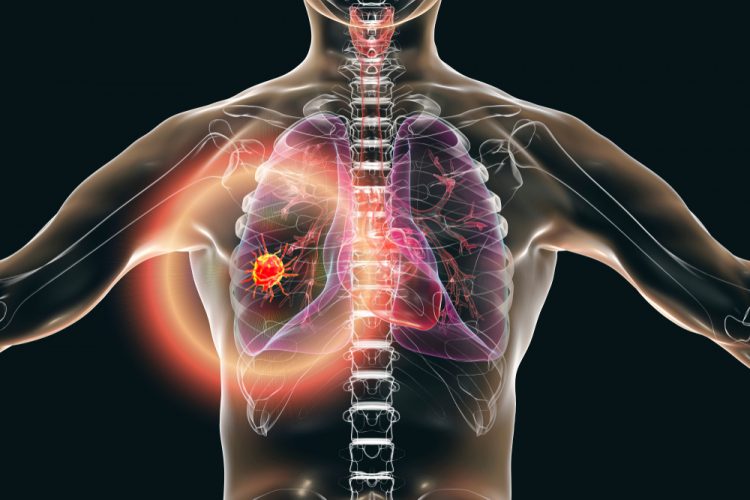Imfinzi increases five year survival to 43 percent in Stage III lung cancer trial
Posted: 8 June 2021 | Hannah Balfour (European Pharmaceutical Review) | No comments yet
New data shows AstraZeneca’s Imfinzi (durvalumab) achieved an unprecedented five year survival rate of over 40 percent in patients with Stage III non-small cell lung cancer.


Updated Phase III trial results show AstraZeneca’s Imfinzi (durvalumab) demonstrated a sustained, clinically meaningful overall survival (OS) and progression-free survival (PFS) benefit at five years in patients with unresectable, Stage III non-small cell lung cancer (NSCLC) who had not progressed following concurrent chemoradiation therapy (CRT). Imfinzi was approved for unresectable Stage III NSCLC after CRT in the US, Japan, China, across the EU and in many other countries based on earlier results from this trial.
The PACIFIC trial was a Phase III, randomised, double-blinded, placebo-controlled, multi-centre trial. Results from the updated post-hoc analyses showed an estimated five-year OS rate of 42.9 percent for patients treated with Imfinzi versus 33.4 percent for those on placebo after CRT. Median OS was 47.5 months for Imfinzi versus 29.1 for placebo. Following a maximum treatment course of one year, an estimated 33.1 percent of patients treated with Imfinzi had not progressed five years after enrolment versus 19 percent for placebo. These results build on the primary PFS and OS analyses published in The New England Journal of Medicine in 2017 and 2018, which demonstrated a sustained, significant benefit with Imfinzi for these primary endpoints.
Dr David Spigel, Chief Scientific Officer at the Sarah Cannon Research Institute and investigator in the PACIFIC trial, commented: “This trial has once again set a new precedent in the treatment of patients with unresectable, Stage III non-small cell lung cancer. Historically, only 15-30 percent of these patients survived five years but these results show that with up to one year of treatment with Imfinzi, an estimated 43 percent of patients are still alive at five years. Moreover, three quarters of these patients had also not progressed in that time. This is a momentous achievement at the five-year landmark in this curative-intent setting.”
Dave Fredrickson, Executive Vice President, Oncology Business Unit at AstraZeneca, said: “Five-year survival is a clinically significant and emotionally meaningful milestone for people with cancer and their families, and it’s incredible to see the majority of patients surviving that long have not progressed four years after completing treatment. These results – the first of their kind in Stage III unresectable lung cancer – reinforce the long-term benefit of Imfinzi as the established standard of care in this curative-intent setting. With trials like PACIFIC and our comprehensive development programme in early-stage disease across cancer settings, our strategy is to improve cancer outcomes by treating patients as early as possible, aiming to deliver life-changing treatments that increase the potential for cure.”
In the primary OS analysis of the PACIFIC Phase III trial, the most common adverse events (AEs) (≥20 percent) among patients treated with Imfinzi versus placebo were cough (35.2 percent versus 25.2 percent), fatigue (24.0 percent versus 20.5 percent), dyspnoea (22.3 percent versus 23.9 percent) and radiation pneumonitis (20.2 percent versus 15.8 percent). A grade 3 or 4 AE was experienced by 30.5 percent of patients treated with Imfinzi versus 26.1 percent for placebo. Additionally, 15.4 percent of patients discontinued treatment due to AEs with Imfinzi versus 9.8 percent for placebo.
These results were presented during the 2021 American Society of Clinical Oncology (ASCO) Annual Meeting.
About Imfinzi
Imfinzi (durvalumab) is a human monoclonal antibody that binds to PD-L1 and blocks the interaction of PD-L1 with PD-1 and CD80, preventing immune evasion by the tumour and thus releasing the inhibition of anti-tumour immune responses.
AstraZeneca has several ongoing registrational trials focused on testing Imfinzi in earlier stages of lung cancer, including in potentially curative settings (PACIFIC-2, 4 and 5, MERMAID-1 and 2, AEGEAN, ADJUVANT BR.31, and ADRIATIC Phase III trials). The company is also testing novel combinations with Imfinzi in two Phase II platform trials in the Stage III unresectable setting (COAST) and neoadjuvant early-stage setting (NeoCOAST).
Related topics
Anti-Cancer Therapeutics, Antibodies, Biologics, Clinical Trials, Drug Development, Drug Safety, Drug Targets, Immunotherapy, Research & Development (R&D), Therapeutics









